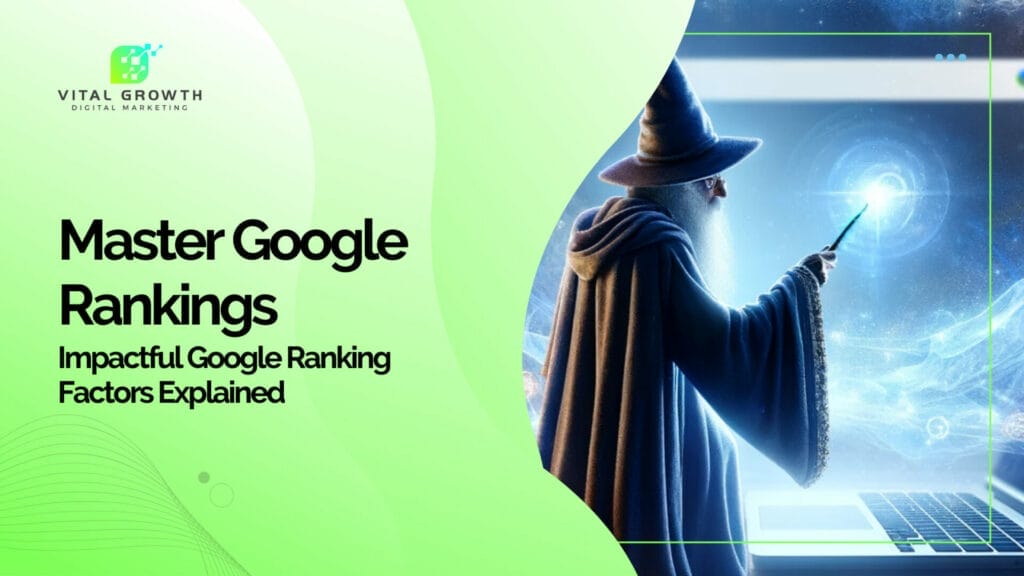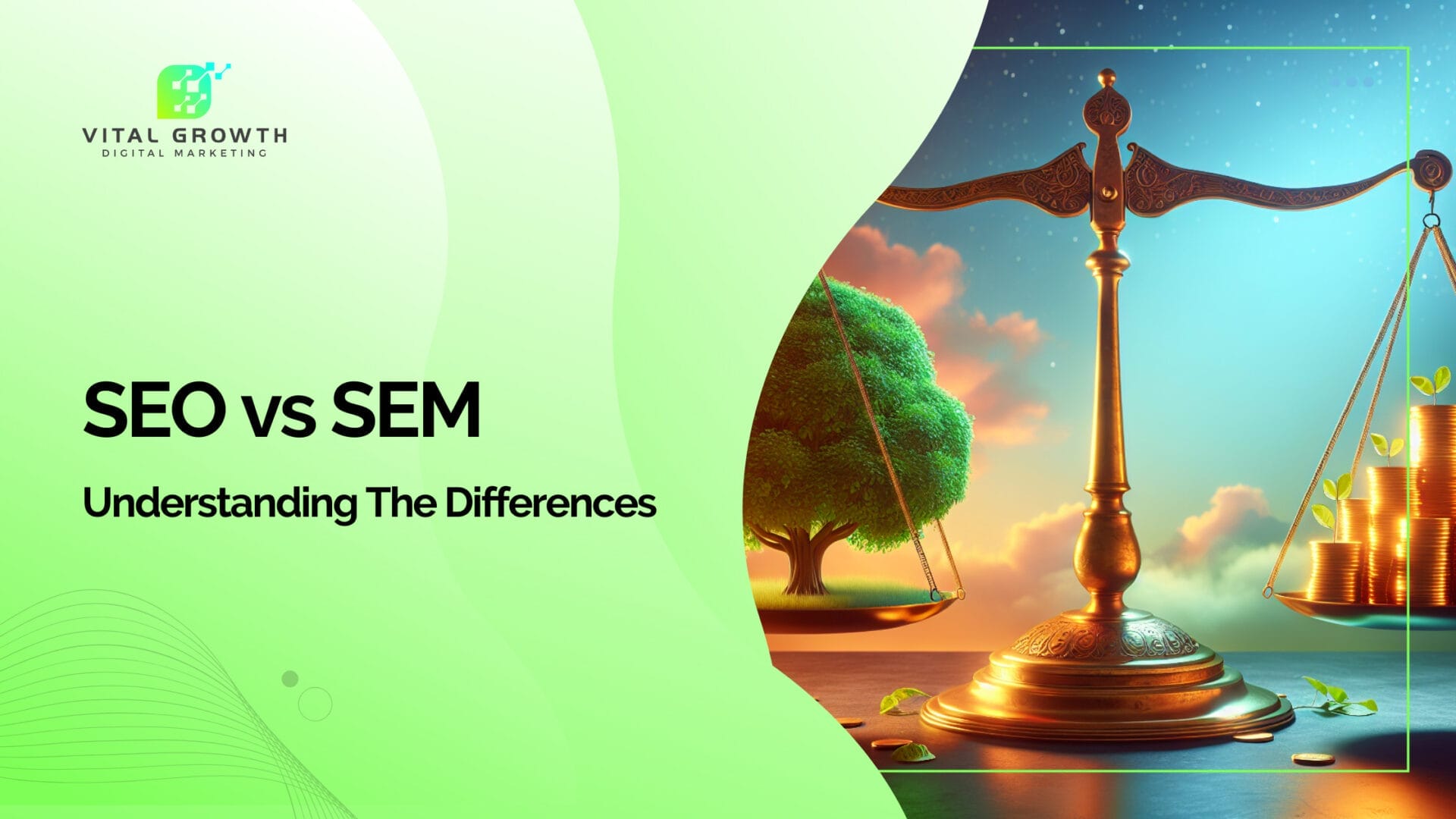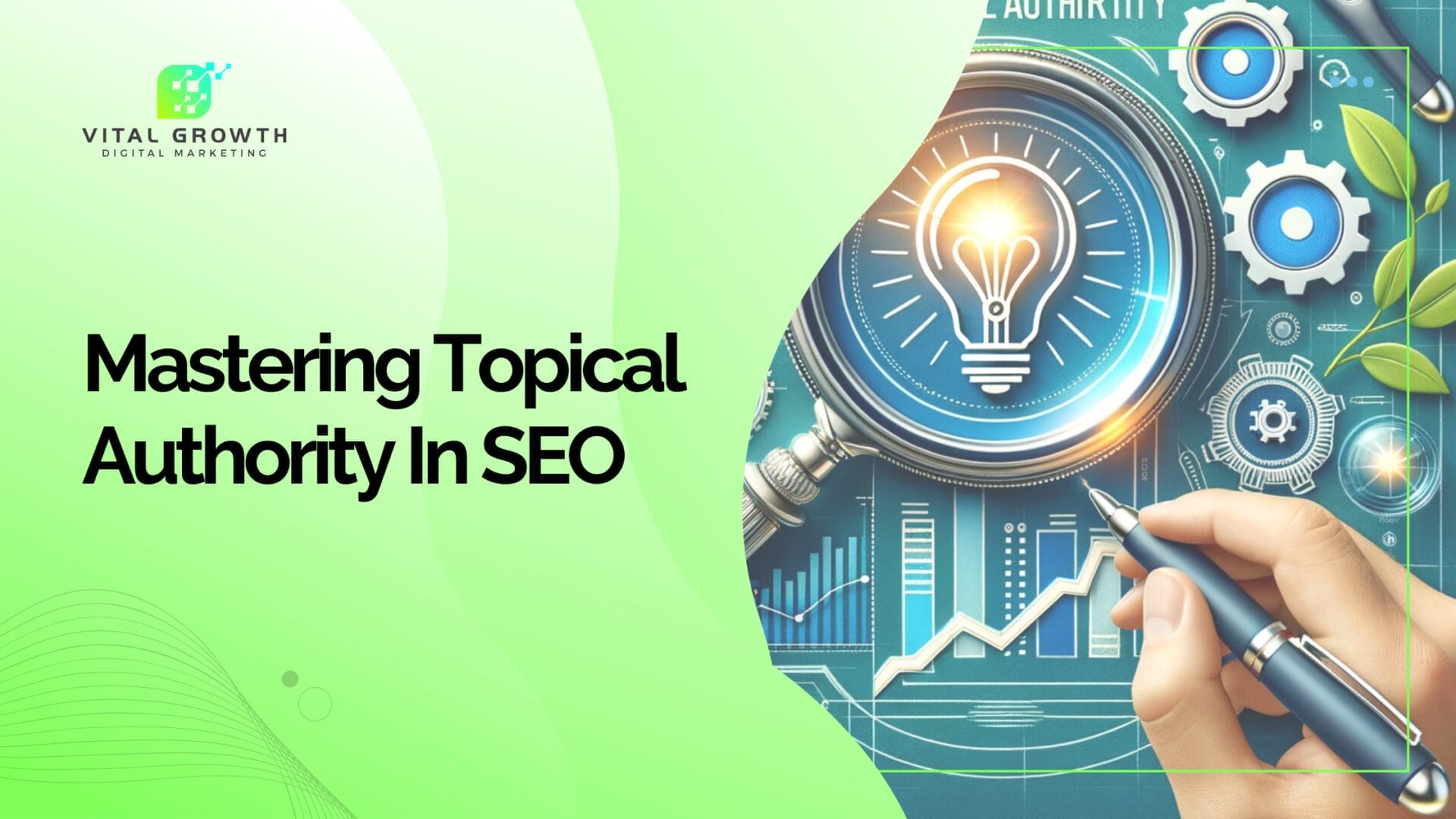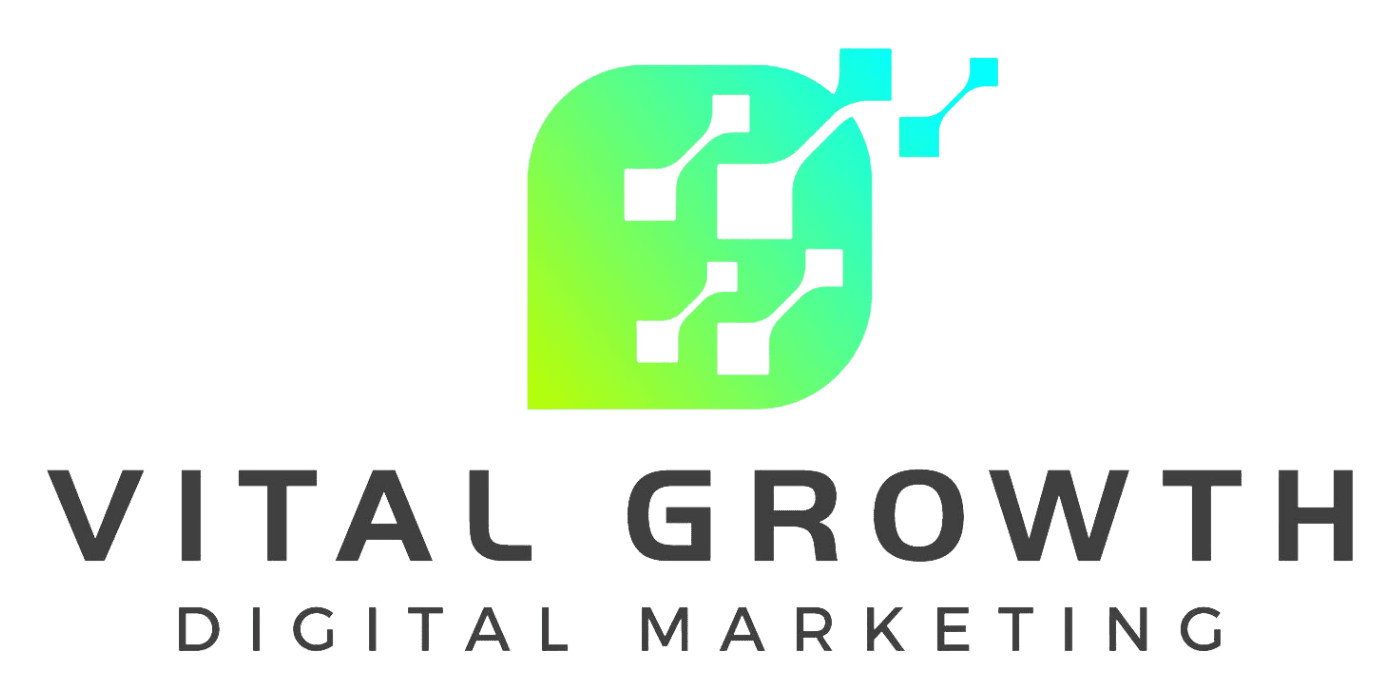Learning to master Google rankings is the key to boosting your website’s visibility, building trust with your audience, and ultimately, driving your revenue growth. Consider this guide as your all-access pass to understanding and leveraging the most influential Google ranking factors for enhancing your SEO.
We will walk you through decoding Google’s ranking algorithms, understanding the role of E-E-A-T in content evaluation, and aligning with user search intent, crafting titles and descriptions, and optimizing web page load times for technical SEO.
Google’s E-E-A-T (Experience, Expertise, Authority, Trustworthiness) plays a major role in content evaluation. By creating quality content that exhibits these qualities, you can enhance your chances of securing a higher position in Google search results.
When it comes to technical SEO, we’ll discuss the importance of optimizing page load times. By ensuring your website loads quickly and is free of errors, you can provide a seamless browsing experience and meet the increasing demand for speed, thus improving your search rankings.
We’ll talk about off-page SEO strategies, such as building quality backlinks and leveraging social media influence, and even touch on advanced strategies like leveraging rich snippets and employing query analysis.
This guide is your ticket to skyrocketing your website’s search performance and leaving your competitors in the dust. You’ll gain the knowledge and tools to master the Google rankings game. Buckle up and get ready for a thrilling ride!
Key Takeaways
- Learn Google’s ranking algorithm basics to boost organic online presence.
- Enhance content for user search intent and apply on-page SEO techniques such as integrating keywords in content, crafting clickable meta titles/descriptions, intuitive website navigation, and securing HTTPS.
- Recognize the role of mobile friendliness, website security, and fast page load times in technical SEO.
- Understand the importance of E-E-A-T (Expertise, Authority, Trustworthiness) in content evaluation and its impact on Google rankings.
- Learn the significance of optimizing page load times for technical SEO and providing a seamless user experience.
- Utilize offsite SEO strategies like building quality backlinks and advanced retrieval techniques to elevate rankings and organic traffic.
- Discover how to leverage social media influence and rich snippets for improved visibility and higher rankings.
- Learn advanced strategies such as query analysis for improved content relevance and retrievability.
Decoding Google Search Ranking Algorithms

Google’s ranking algorithms are a multifaceted and dynamic system with the goal to deliver the most fitting and high-quality content in response to users’ search queries. Two significant elements of google ranking algorithms are experience, expertise, authority, and trustworthiness (E-E-A-T) and comprehension of user search intent.
Experience, expertise, authority, and trust (E-E-A-T) are big aspects of Google’s content evaluation process. Google prioritizes content from creators with proven expertise and credibility in their respective fields, ensuring that the information presented to users is accurate, reliable, and valuable.
Aligning your content with user search intent is equally important, as it guarantees that your webpages address the specific needs and questions of users, leading to higher search rankings.
The connection between content quality and SEO is a major element in enhancing search rankings. High-quality, original, and relevant content not only enhances user engagement but also sends positive signals to Google, resulting in better search performance.
By focusing on these aspects, you can effectively navigate Google’s ranking algorithm and boost your website’s visibility.
The Role of E-E-A-T in Content Evaluation
Google’s E-E-A-T, previously E-A-T as experience was recently added, framework evaluates content creators and their content based on experience, expertise, authority, and trustworthiness. Exhibiting these qualities in your content, and entire site, enhances your probability of securing a higher position in Google search results.
Google wants to show content to its users that were written by people who are experts in the field. If you can prove these 4, very important google ranking factors, you will not have an issue ranking on google and other search engines.
One strategy to showcase your specialized knowledge is the hub and spoke method, which involves creating a central page covering a specific topic and additional pages providing more in-depth information about each aspect outlined in the central page. This approach not only helps to establish your expertise but also organizes your website for better user experience.
Another good way to increase E-E-A-T is to have multiple forms of content outputs. Start a Youtube channel, continue writing blogs on your website, create a personal website, join in as guests on podcasts, join and contribute to forums, and be sure to stay active on the social media that your target audience are on.
Understanding User Search Intent
Search intent, or the reason behind a user’s search query, play a huge role in influencing the success of your content in search engine rankings.
To rank higher, your content must align with user search intent, addressing their specific needs and questions. Failure to do so may result in low click-through rates and high bounce rates, which Google interprets as a sign that your content does not meet user search intent.
To ensure that your keyword matches user intent, evaluate the search results for your target keyword in a private browser and assess whether your content would be suitable among them. If the top 10 results in the SERPs, Search Engines Result Page, is a list, your content should also be a list.
The Intersection of Content Quality and SEO
Content quality and SEO collectively work towards enhancing search rankings. Original, relevant, and engaging content is not only beneficial for user experience but also sends positive signals to search engines like Google.
Domain age and authority play a significant role in pages ranking, while keeping content up-to-date is essential for topics involving news or trends, as Google prioritizes pages with the most current information.
The Pillars of On-Page Optimization

On-page search engine optimization includes the optimization of multiple elements on your webpages, such as meta titles and descriptions, headers, inter-linking, images, keywords, content length, navigation, among other factors, with the aim to enhance your website’s position in search engine results.
These factors not only enhance the user experience but also help search engines understand your content and determine its relevance to user queries.
Crafting Compelling Meta Titles and Descriptions
Meta titles and descriptions are the starting elements of SEO, as they assist search engines in understanding your page’s content and allocating it relevant rankings. An effective meta title should be captivating and deliver value to the reader while including pertinent keywords. Similarly, an effective meta description should be concise, accurately reflect the page’s content, and engage the reader while promising value.
Incorporating strategic keywords, avoiding duplicated titles and descriptions, and adhering to the recommended character limits are among the best practices for optimizing meta titles and descriptions.
Strategic Keyword Integration
The natural incorporation of relevant keywords and NLP, or Natural Language Processing, within your content is important for enhancing search rankings and aligning with user queries.
Keyword research is fundamental for determining the important keywords to target, which in turn helps optimize your content for the appropriate keywords and increase your chances of ranking higher on search engines.
For ideal results, focus on two or three keywords at most and ensure they comprise 1-2% of the content, allowing your content to be more engaging for the audience while still achieving high search engine rankings and avoiding keyword stuffing.
Enhancing User Experience with Intuitive Navigation
A well-organized website with distinct headings and subheadings facilitates information retrieval and enhances user experience. Proper heading and subheading placement can create a hierarchical structure, breaking down content into digestible portions, guiding readers to the desired information, and aiding search engines in recognizing the context and relevance of each section.
By focusing on intuitive navigation, you can provide users with a seamless browsing experience and higher overall satisfaction with your website. Each webpage should only have one H1 header, and each H2 will support the H1, H3s will support the H2 and so on.
Technical SEO: Ensuring Your Site Meets Search Engines Standards

Technical SEO involves optimizing your website’s technical elements to align with search engine standards, directly influencing your search engine ranking. Key aspects of technical SEO include mobile friendliness, page load times, and website security, all of which contribute to a better user experience and higher search rankings.
Importance of Mobile Friendliness in the Age of Smartphones
With the increasing usage of mobile devices, mobile optimization becomes critical for search engine ranking and user experience. Mobile friendliness is a major SEO ranking factor, as more people utilize mobile devices than desktops to access the web than ever before.
Google now prioritizes the mobile version of a website when assessing its ranking through mobile-first indexing.
By optimizing your website for mobile, you can improve your search rankings and cater to the growing number of mobile users.
To optimize your website for mobile, use a responsive theme, and be sure to check, and adjust, the mobile version of each page before publishing.
The Speed Factor: Optimizing Page Load Times
Speedy page load times enhance user experience and search rankings. Tools like GTmetrix and PageSpeed Insights are available to check and optimize your website’s performance, including core web vitals, allowing you to identify areas for improvement and implement changes to enhance page load times and overall user satisfaction.
It’s important to make sure your website loads quickly on both desktop and mobile devices to meet the increasing demand for seamless browsing experiences.
Securing Your Site with HTTPS
Adopting the HTTPS protocol offers several benefits:
- Bolsters website security
- Is a significant Google ranking factor
- Ensures the encryption of data between a website and a user’s browser
- Protects sensitive information
- Provides a secure browsing experience for users.
In addition to its security benefits, HTTPS also contributes to improved search rankings, as search engines will prioritize secure websites when determining search results.
Off-Page SEO: Building Authority Beyond Your Site

Off-page SEO includes ranking factors that aren’t specific to pages, such as backlinks and social media influence. These factors help to boost the visibility of your website and can lead to higher rankings in search engine results pages (SERPs).
By building authority beyond your site, you can enhance your website’s overall search performance and visibility.
The Power of Backlinks: Quality Over Quantity
High-quality backlinks from authoritative websites are great for enhancing and maintaining search rankings and organic traffic.
Rather than focusing on the quantity of backlinks, prioritize obtaining links from reputable sources with high domain authority. These high-quality links demonstrate to Google that your content is valuable and trustworthy, resulting in improved search rankings.
Additionally, fixing broken links and optimizing internal links on your website can further boost your online presence.
Social Media Influence: Amplifying Your Content’s Reach
Social media platforms can indirectly influence search engine rankings by extending content reach and boosting user engagement. By sharing your content on platforms like YouTube, Twitter, Facebook, Instagram, LinkedIn, and Pinterest, you can boost your website’s visibility, attract more visitors, and ultimately, improve your search engine rankings.
In addition, engaging with your audience on social media and encouraging user-generated content can further enhance your website’s authority and search performance.
Advanced Strategies for Ranking Success

To elevate your SEO efforts, several advanced strategies can assist in further improving your search rankings. Leveraging rich snippets and employing query analysis are two such techniques that can enhance the visibility and relevance of your content, leading to higher search rankings and increased organic traffic.
Leveraging Rich Snippets for Enhanced Visibility
Rich snippets offer supplementary information in search results with structured data, such as:
- Ratings
- Reviews
- Prices
- Other relevant details
This additional information makes the search result more appealing and informative. By implementing structured data on your website, you can increase the visibility and click-through rates of your web pages, leading to higher organic traffic and improved search rankings.
Rich snippets can be an effective way to stand out in the crowded search results and attract more clicks.
Employing Query Analysis and Advanced Retrieval Techniques
Scrutinizing user queries and utilizing advanced retrieval techniques can assist in enhancing your content’s relevance and retrievability, resulting in higher search rankings. Query analysis involves categorizing and analyzing search queries to comprehend user intent and optimize your website content accordingly, while advanced retrieval techniques include optimizing content’s time to value, constructing topic clusters, and utilizing strategic internal linking.
By employing these techniques, you can ensure that your content is more accurately aligned with user queries, resulting in improved search performance and user satisfaction.
Summarizing Google Ranking Factors
Mastering Google rankings is a multifaceted endeavor that requires a combination of on-page, off-page, technical, advanced SEO strategies, and lots of practice. By focusing on E-E-A-T, user search intent, meta titles and descriptions, keyword integration, intuitive navigation, mobile friendliness, page load times, website security, backlinks, social media influence, rich snippets, and query analysis, you can effectively elevate your website’s search performance and outshine the competition.
The journey to SEO success may be challenging, but with persistence, dedication, and the right strategies, your website can reach new heights.
What makes you rank higher on Google?
To rank higher on Google, optimizing content such as keyword placement and meta descriptions is highly important. Building authoritative backlinks to your site through the creation of relevant, engaging content is vital. Finally, user experience factors like page loading speed and mobile-friendliness should be taken into account to improve rankings.
How do you determine your Google ranking?
To determine your Google ranking, you can use a live rank checker by entering a keyword or phrase and adding your domain. Alternatively, you can also use Google Search Console and click on the ‘Search Results’ tab under Performance, selecting ‘Queries’ to see all the search terms that your website ranks for. Finally, select the average position in the chart to see the results in the table below. Our personal favorite, however, is to simply search the term in Google.
Is https a Google ranking factor?
Google has confirmed that HTTPS is a ranking factor since 2014, offering a small rankings boost when implemented. Therefore, it is safe to say that HTTPS is a Google ranking factor.
How can I improve the on-page SEO of my website?
Optimize your website for improved on-page SEO by creating compelling meta titles and descriptions, strategically integrating keywords, and enhancing user experience with intuitive navigation.
What is the significance of mobile friendliness in SEO?
Mobile friendliness is essential for SEO, as it affects both search engine rankings and user experience, as more web users are accessing content through mobile devices.












